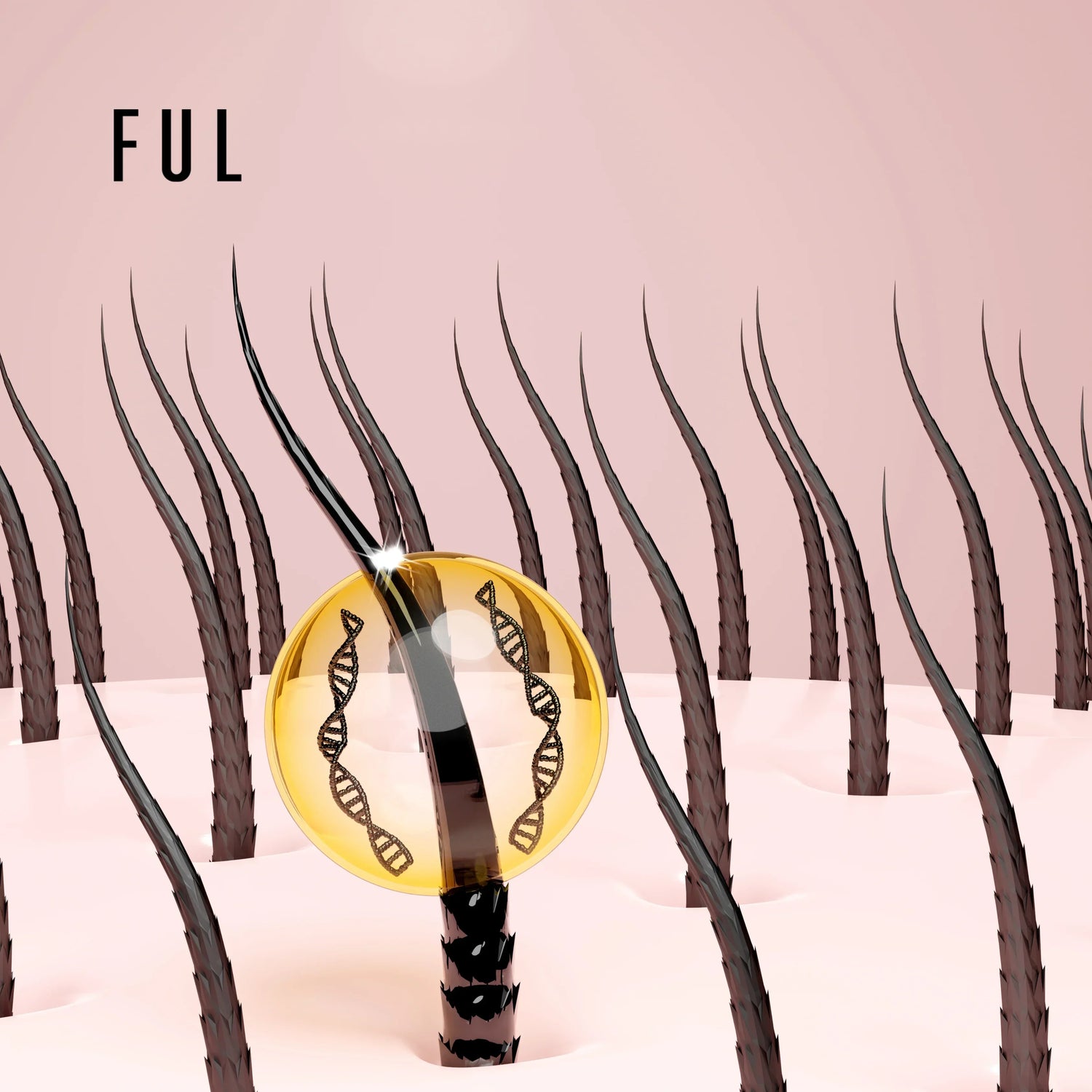To treat dry scalp, use proper shampoos, condition regularly, apply hydrating oils or serums, and exfoliate lightly to remove flakes. A dry scalp requires effective treatment because it affects both comfort and hair health. In the UK, many people notice dryness during colder months, when central heating and low humidity strip away natural oils. Symptoms of dry scalp include tightness, irritation, and visible flakes, which are often confused with dandruff, though the two have different causes.
Dry scalp can be managed with consistent care. A routine that includes a sulphate-free cleanser, a nourishing scalp moisturiser, and weekly rituals such as masks or exfoliating treatments helps restore hydration and strengthen hair. The goal is to move beyond short-term fixes and achieve lasting balance. This guide will provide clear, step-by-step advice to help you recognise causes of dry scalp, spot symptoms, and choose dry scalp treatments that work.
What Is a Dry Scalp?
A dry scalp is a condition where the skin on your head loses too much moisture, leaving it tight, irritated, and prone to small white flakes. Unlike dandruff, which results from excess oil and yeast (Malassezia) causing larger, oily yellow flakes, dry scalp is caused by a hydration imbalance and insufficient natural oils. This lack of moisture weakens the scalp’s barrier, leading to itching, visible dryness, and discomfort.
What Causes Dry Scalp?
A dry scalp can be caused by various factors, such as environmental conditions, daily hair care routines, underlying skin issues, and lifestyle decisions. Each of these factors contributes to the moisture levels of the scalp and can exacerbate dryness if not properly addressed. Therefore, recognising your personal triggers among these is the first step toward effective treatment.
1. Environmental Factors
Weather strongly impacts scalp hydration, particularly in the UK, where cold winters, indoor heating, and low humidity reduce the scalp’s natural moisture levels. Dry indoor air combined with seasonal temperature changes disrupts the skin barrier, while outdoor pollution adds further stress. These conditions make the scalp more prone to dryness, flaking, and irritation.
2. Haircare Habits and Products
Harsh products strip natural oils, and daily shampooing with sulphate-based formulas can make dryness worse. Overwashing with hot water, heavy styling, or skipping scalp moisturisers all contribute to irritation and flakes. Switching to gentle, hydrating formulas helps restore balance and reduce itchy scalp flare-ups.
3. Underlying Skin Conditions
Certain conditions, such as eczema, psoriasis, and seborrhoeic dermatitis, can lead to scalp dryness. These medical causes often trigger persistent flaking and irritation beyond simple dryness. If symptoms become severe or resistant to basic care, it is best to seek advice from a GP or dermatologist.
4. Lifestyle and Diet
Lifestyle influences scalp hydration, with dehydration, poor nutrition, and stress being common triggers. Low water intake, lack of omega-3 fatty acids, and high stress hormones can reduce the scalp’s ability to stay moisturised. Sleep quality and overall wellness also play a role, making holistic care essential for long-term scalp health.
What are the Signs and Symptoms of a Dry Scalp?
Typical signs and symptoms of a dry scalp include fine white flakes, persistent itching, and an uncomfortable, tight sensation across the skin. In some cases, people may also feel mild stinging or burning. Unlike dandruff, which often produces thicker, greasy flakes that look yellow or waxy, dry scalp creates lighter flakes that fall away easily. Redness, irritation, and brittle hair are also common, since a lack of natural oils weakens both the scalp and hair strands.
1. Flaking and Dry Patches
Dry scalp produces delicate flakes that are lighter and drier than dandruff. While dandruff tends to create clumps of oily yellow flakes that stick to the scalp, dry scalp leaves fine, powdery fragments that shed more easily. These flakes may appear in scattered patches, making the scalp look uneven and rough.
2. Itchiness and Irritation
When the scalp loses its protective oils, it becomes itchy and uncomfortable. Scratching to relieve this sensation often damages the skin further, leading to inflammation or small abrasions. Using anti-dandruff shampoo in this situation can be counterproductive, since it targets excess oil rather than restoring moisture.
3. Tightness or Sensitivity
A dry scalp often feels tense or unusually sensitive, especially after exposure to hot water, heated styling tools, or cold winter weather. This sensation reflects dehydration of the skin barrier, which struggles to lock in sufficient moisture.
4. Dry Hair and Breakage
Because the scalp cannot supply enough natural oils, the hair itself becomes brittle. Strands lose flexibility, appear dull, and break more easily, resulting in split ends. Addressing scalp hydration is therefore essential, as surface hair treatments alone will not correct the underlying dryness.
How to Treat a Dry Scalp Effectively?

To treat a dry scalp effectively, switch to a gentle, hydrating shampoo and conditioner, wash your hair with lukewarm water, and keep the scalp nourished with natural oils such as coconut or jojoba. Follow these steps to care for your scalp properly:
1. Choose the Right Shampoo and Conditioner
Gentle cleansers restore scalp balance by removing impurities without stripping natural oils. Look for sulphate-free, moisturising formulas enriched with hydrating ingredients such as hyaluronic acid. For example, a hydrating HA shampoo paired with a nourishing conditioner supports daily scalp comfort. Avoid overwashing, as frequent shampooing can worsen dryness.
2. Exfoliate and Detox the Scalp
Scalp exfoliation clears buildup from dead skin cells, styling products, and excess sebum. Using a mild scalp scrub or detox scalp treatment once a week helps reduce white flakes and improve absorption of treatments. The process should be gentle, since harsh exfoliation can damage the scalp barrier.
3. Hydrate with Serums or Oils
Proper serums act as a scalp moisturiser by delivering lightweight hydration directly to the skin. A hyaluronic acid serum, for instance, binds water to the scalp for long-lasting comfort. Oils such as jojoba or coconut provide nourishment but can feel heavier, so they suit occasional use. Apply these products to a damp scalp for maximum benefit.
4. Use a Weekly Hair Mask
A weekly hair mask deeply hydrates both the scalp and hair. Formulas designed for intense hydration, like an Intense Moisture Hair Mask, replenish water, soften brittle strands, and restore shine. Incorporating this into a self-care ritual also supports relaxation while strengthening scalp health.
5. Massage the Scalp Regularly
Massage boosts circulation and oil flow, which in turn supports healthy scalp function. Spending three to five minutes massaging the scalp encourages relaxation and enhances absorption of treatments. A scalp massager brush can make the process easier and more effective. But how often should you use a scalp massager? The answer can range from daily to 2-3 times per week, depending on the individual's specific scenario, such as oily hair or a sensitive scalp.
6. Adjust Lifestyle and Daily Habits
Lifestyle affects scalp condition as much as products do. Staying hydrated, eating a diet rich in omega-3 fatty acids and vitamins, and managing stress all support long-term scalp balance. Reducing heat styling and protecting the scalp from harsh weather are simple, consistent changes that prevent dryness from recurring.
Home Remedies vs Professional Products
When treating a dry scalp, natural remedies such as coconut, jojoba, or aloe vera oils can provide quick relief and surface hydration, while professional treatments like hyaluronic acid serums or detox scalp products are formulated to deliver deeper hydration and longer-lasting results. The best choice depends on whether the dryness is mild and occasional or persistent and more severe.
|
Aspect |
Home Remedies |
Professional Products |
|
Effectiveness |
Provide surface hydration and temporary relief |
Deliver targeted hydration and longer-lasting results |
|
Best For |
Mild, occasional dryness |
Persistent, recurring dryness |
|
How They Work |
Coat the scalp to reduce dryness |
Penetrate deeper, rebalance pH, and support scalp barrier |
|
Ease of Use |
Simple, natural, often DIY |
Ready-made, formulated by trichologists |
|
Limitations |
Do not address underlying causes |
Require consistency and investment |
|
Examples |
Coconut Oil, Jojoba, Aloe Vera |
HA Serum, Detox Scalp Treatment |
How to Prevent Dry Scalp
To prevent dry scalp, focus on healthy daily habits that keep the scalp hydrated and balanced. Simple changes to washing routines, diet, stress management, and consistent care reduce the risk of recurring dryness and irritation. Treating prevention as part of self-care makes it easier to maintain long-term scalp health.
1. Smart Washing Routine
Gentle washing maintains the scalp’s protective oils, which act as a natural moisturiser. Aim to wash hair only two to three times per week, using lukewarm water instead of hot to prevent stripping moisture. A sulphate-free shampoo keeps the scalp clean without causing irritation or worsening dryness.
2. Balanced Diet and Hydration
Nutrition plays a direct role in scalp health. Omega-3 fatty acids from foods like salmon, walnuts, or flaxseed reduce inflammation and support hydration. Pairing these with vitamins A, E, and C, plus drinking enough water daily, strengthens the scalp barrier, helping it resist flaking, itching, and irritation over time.
3. Stress and Lifestyle Management
Stress hormones such as cortisol interfere with the scalp’s ability to retain moisture, often leading to flare-ups. Practising yoga, meditation, and breathing techniques reduces stress while improving circulation. Quality sleep also allows the scalp’s skin barrier to repair overnight, preventing recurring dryness and promoting healthier scalp and hair function.
4. Consistent Scalp Care Practices
Regular care prevents dryness from becoming a cycle. Incorporating weekly moisture masks, daily lightweight serums, and scalp massages keeps hydration levels steady and circulation active. These habits support both the scalp and hair, making them stronger and more resilient against environmental stressors like central heating, pollution, and cold weather.
When to See a Professional About Dry Scalp
Persistent dryness sometimes signals more than just a lack of moisture. While most cases improve with a consistent routine, some symptoms suggest an underlying skin condition that requires medical attention. Knowing when to seek help ensures early diagnosis and the right treatment. You should see a GP or dermatologist if you notice:
-
Persistent dryness that does not improve with gentle shampoos, serums, or masks.
-
Severe flaking that goes beyond occasional white particles and becomes constant or heavy.
-
Intense itching or burning that interferes with daily comfort or sleep.
-
Redness, swelling, or pain suggesting inflammation or infection.
-
Signs of skin conditions such as eczema, psoriasis, or seborrhoeic dermatitis on the scalp.
-
Hair loss or breakage linked to ongoing dryness and scalp irritation.
Best Products for Dry Scalp Relief
Scalp products provide relief and hydration by targeting dryness directly and supporting long-term scalp balance. Using the right treatments helps reduce flakes, calm irritation, and restore comfort. Here are some of the best products for dry scalp designed to be gentle, effective, and easy to integrate into any hair care routine:
-
Detox Scalp Treatment: It clears buildup, refreshes the scalp, and prepares it for hydration.
-
Hyaluronic Acid Serum: Hyaluronic Acid Serum deliver lightweight, lasting hydration that absorbs quickly into the scalp.
-
Intense Moisture Hair Mask: Deeply conditions both scalp and hair, restoring softness and shine.
-
Scalp Massager: Stimulates circulation, enhances product absorption, and promotes relaxation.
Final Thoughts on Dry Scalp Care
Dry scalp care requires a holistic approach that combines targeted treatments, preventive habits, and consistent routines. Choosing gentle shampoos, hydrating serums, and nourishing masks helps restore moisture, while lifestyle changes such as staying hydrated, managing stress, and eating a balanced diet strengthen scalp health from within. Together, these steps reduce common symptoms like flaking, tightness, and irritation, making the scalp more comfortable and resilient.
Although dry scalp is a widespread concern, it is both manageable and preventable with the right scalp treatment. Paying attention to personal triggers, using supportive products, and maintaining long-term consistency create lasting improvement. With patience and steady effort, you can achieve a balanced scalp, stronger hair, and greater confidence in your overall hair health.

